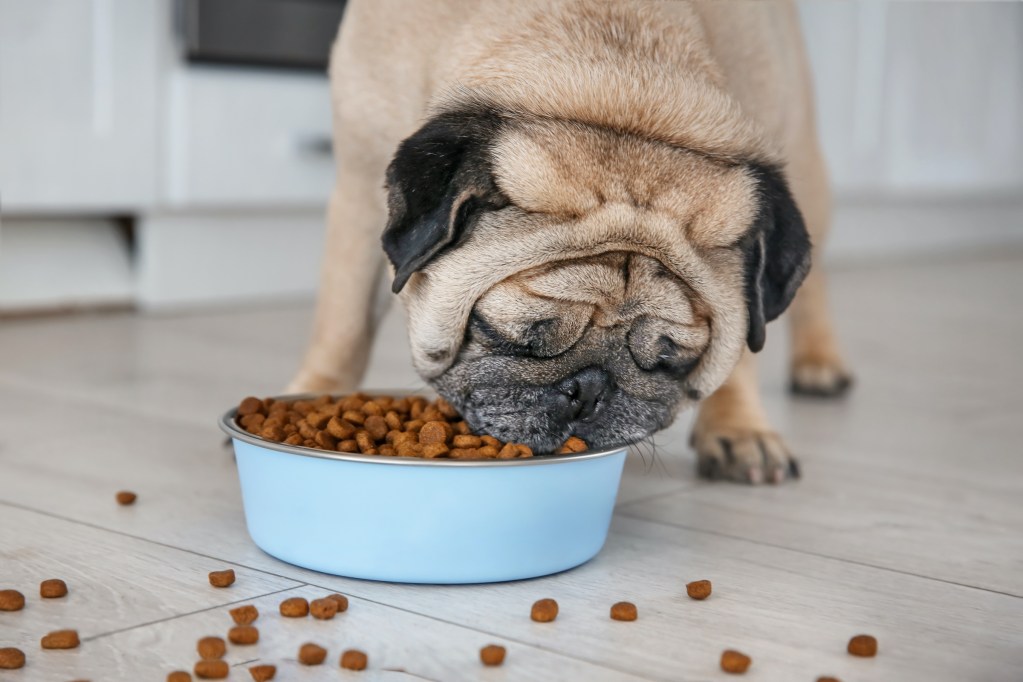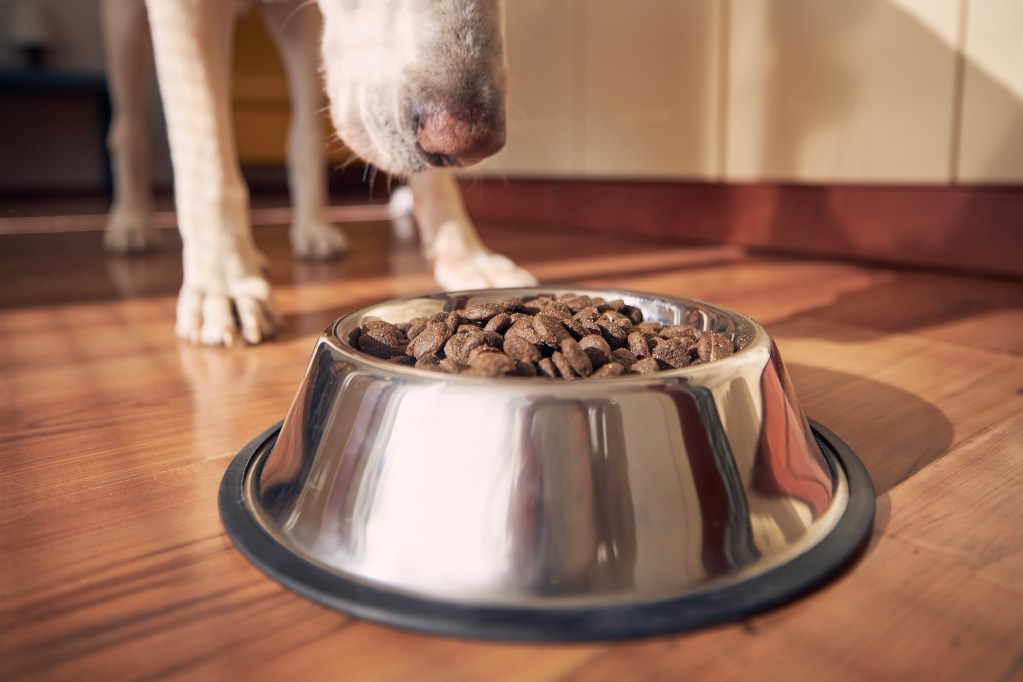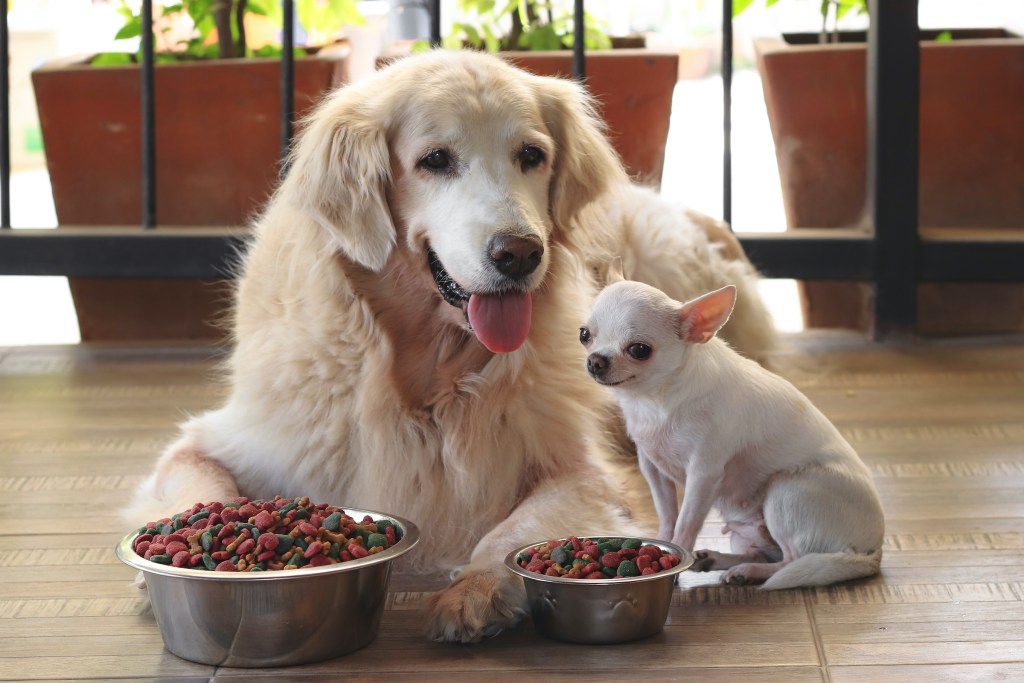
As your dog gets older, you’ll need to make some changes to your home and routine to keep them feeling their best. That includes changing their dog food, too!
Although the best food for older dogs varies depending on your buddy’s health, size, and specific needs, there are several guidelines you can follow to help you find a product that does the trick. Of course, your local veterinarian will be your most knowledgeable resource, especially if they have a long history with your pet. They can also recommend and approve a prescription diet for your dog, giving you even more brands, flavors, and nutrients at your disposal. And since nutrition greatly impacts overall health, investing in high-quality food is paramount.
We did some research since it can be tricky to know which kibbles and canned foods make a veterinarian’s approved list. Here’s what we found, including a selection of six vet-recommended dog foods you can try with your senior dog.

What’s the best food for older dogs? Here are six options and what makes them so good
Though your senior dog may be as energetic as ever, their body will need a different diet as they age. Banfield Pet Hospital’s Dr. KT Boyle, DVM, told NBC News that because older pets have particular nutritional needs, you’ll need to think about a few different factors when choosing their food.
Older dogs need fewer calories and more supplementation than younger pups, for example. This reduced caloric need is because of the way an animal’s metabolism slows as they age, though the exact supplements they need depend on the individual. To find out exactly what will benefit them, have a conversation with your veterinarian. It’s that easy!
Dr. Boyle notes that even though senior dog foods contain many helpful nutrients — like glucosamine and fatty acids for joint health — you might need to add supplement drops or chews to your pet’s diet. Luckily, there are many to choose from and many ways to get them.
When it comes to wet versus dry food, though, there can be benefits to both. Dogs with dental issues may find wet food easier to eat, but the texture in kibble can help fight plaque and tartar buildup on your pup’s teeth. The pet nutrition pros at Pedigree remind owners that there is no one right answer. When in doubt, ask your vet!
That being said, there are a few senior dog foods that Dr. Boyle recommends over others. These include:
- Eukanuba Senior Small Breed Dry Dog Food
- Iams ProActive Health Healthy Aging Senior Dry Dog Food
- Hill’s Science Diet Dry Food Food for Senior Dogs
- Blue Buffalo Life Protection Formula Natural Senior Dry Dog Food
- Royal Canin Size Health Small Aging Wet Dog Food
- Nutro Natural Choice Senior Dry Dog Food
Remember, your dog is the one who ultimately picks their food, so don’t feel discouraged if you need to try an option or two before finding one you both approve of. It can also help to change your pet’s diet gradually, over the course of a week or two, to help them adjust and prevent stomach upset (via Pedigree).

What’s the best thing to feed an older dog? Are certain kinds of diets recommended for aging pets?
If you’re looking for the best food for older dogs, there are many great ways to go. Your dog’s preference will determine which flavors you buy and whether wet or dry food makes the cut, but there are a few guidelines to consider on your end.
For one, Dr. Boyle recommends avoiding grain-free diets unless your pet has a grain sensitivity (or your vet recommends it). Not only do grains have nutritional value, but there’s also ongoing research into the relationship between grain-free foods and a heart condition called canine-dilated cardiomyopathy. Unless you know that your furry friend will benefit from eliminating grain in the diet–there’s no need!
Another fallacy related to senior dog nutrition is that they need less protein than their younger friends. The American Kennel Club explains that this is not true; senior dogs actually need more protein to make up for the loss of muscle mass that occurs naturally with age. When reading labels of dry food packages, look for a protein percentage of around 28 to 32, which the AKC lists as an appropriate amount for healthy senior pups.
You may also want to consider a low-sodium food for dogs with heart or kidney disease, though whether you opt for a prescription diet or over-the-counter kibble is up to you. A visit with your vet will give you all you need to know about prescription dog foods, which can address health concerns from obesity to kidney disease and even urinary issues.

Questions to ask your veterinarian about finding the best food for older dogs
Learning about all of the different dog food options in one sitting can be overwhelming, but you can help yourself prepare by creating a list of questions to ask your pup’s veterinarian. This way, you’ll be sure to leave the appointment with all the answers you need. If you’re not ready to make a decision quite yet, you’ll at least be one step closer!
Some of the questions you may want to ask your veterinarian include:
Is my dog at an age where switching to senior dog food will benefit them?
Not every dog ages at the exact same rate, so one 8-year-old pup might need a prescription diet or senior dog food while another does not. Many factors contribute to this, including a dog’s breed and size, so don’t expect yourself to simply guess what’s best for your fur baby.
Is my dog at a healthy weight?
No matter what your dog’s age is, they may benefit from a dietary switch if they’re overweight or underweight. Many senior pets also struggle with metabolism and weight, so there are a number of prescription and over the counter foods that may help.
Would switching my dog’s food benefit their health?
Even if your dog isn’t ready for a senior dog food or in need of a special diet for their weight, they’re not necessarily in the clear. Many health conditions can benefit from a specific diet–including dental disease, allergies, and joint issues — so it’s always a good idea to check in with your vet.
What qualities or ingredients should I look for in my dog’s food?
Whether your dog is in need of a certain type of dog food, your veterinarian might be able to give you an idea of what ingredients to look for or avoid. Better yet–they will likely recommend specific dog food products to help you narrow down your search.
Should I consider a supplement for my dog?
Many dogs benefit from the addition of a supplement or meal topper, though your vet will be able to tell you what ingredients to look for. Supplements can provide added nutrition to your furry friend’s meal, though they’re not always a necessity for a healthy pet.
Your best resource for choosing a new food for your senior dog is your veterinarian, but we hope we’ve been able to help you understand what kind of diet your buddy will need. While the details will vary from pup to pup, these are general guidelines that veterinarians and their patients follow. And remember — be patient during this process. It’s an adjustment for everyone!
Editors' Recommendations
- The Best Dry Dog Food of 2023 for a Balanced Diet
- Are Himalayan dog chews safe for your pet? Know this before you buy
- Why is my dog whining? 6 common reasons and what you can do to stop it
- Can dogs have strawberries? Benefits, risks, and how to feed them safely
- Homemade dog food: Should you do it?




